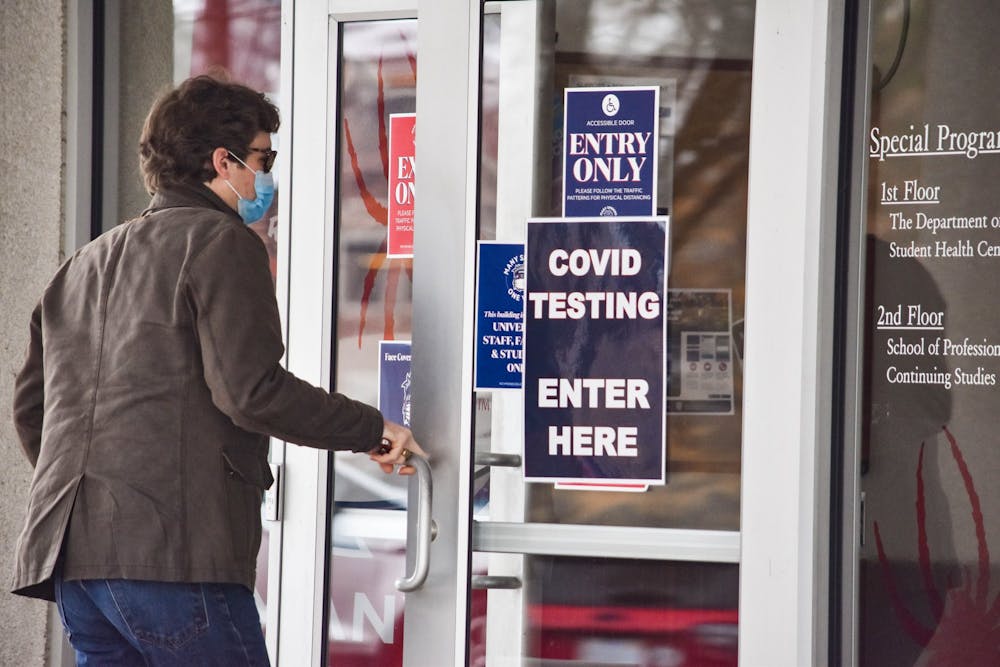All non-remote undergraduate students will be tested for COVID-19 on a biweekly basis, an increase from last semester’s prevalence testing, for campus safety, according to a Jan. 19 email sent to students and families by University of Richmond administrators.
Spring prevalence testing began on Jan. 25 and will continue through the semester, according to the email, sent by Steve Bisese, vice president for student development; David Hale, executive vice president and chief operating officer; and Jeffrey Legro, executive vice president and provost. Testing occurs in the Student Health Center, located in the Special Program Building, according to the email. An antigen test, which involves a nose swab less invasive than the PCR test used last semester, will be used for the prevalence testing, according to the email.
Students who test positive with the antigen test will also get a PCR test for confirmation, Bisese, Hale and Legro wrote.
Non-remote students, including those living off campus, were required to register for a mandatory biweekly testing time slot, according to the email -- and there are consequences for missing a test. After missing a prevalence test, students will be subject to conduct probation. If a second absence occurs, more serious sanctions are possible, such as removal from campus housing, according to the email.
If students miss their scheduled testing time, their college dean will contact them immediately to discuss the absence, according to the email.
Sophomore Nolan Sykes said he hoped the deans would use discretion when punishing students for missing test appointments.
“I think [students who unintentionally miss a test will] probably not get in as much trouble as somebody who purposely avoided it because they might be infected and didn’t want to have to take classes online or something,” Sykes said.
In the Jan. 19 email, Bisese, Hale and Legro wrote that there needed to be an increase in testing to keep the campus safe given the rising COVID-19 cases in the Richmond area and nationally.
Sophomore Emily Garvin agreed that there is a need for increased testing.
“I think it's a really smart thing that the administration chose to do for this semester,” Garvin said. “I think it'll be a good way to hopefully prevent [COVID-19] from spreading on campus.”
Sykes also sees the importance of the increased testing, he said, referencing the increase in COVID-19 cases among the UR community in the first weeks of the semester.
“Just given that case numbers always seem to be going up, it's important that we know as soon as possible who's getting it so that we can get them away from people,” he said.
Enjoy what you're reading?
Signup for our newsletter
UR saw a spike in cases at the beginning of the spring semester, with 101 active cases as of Feb. 4, as shown on the UR COVID-19 Dashboard. The number of positive cases from Jan. 17 to Jan. 30 exceeded the total cases in the fall semester, which was 177 new cases. There were 138 cumulative cases during the fall 2020 semester.
Sophomore Emily Acquafredda said she hoped increased prevalence testing would incentivize students to be more careful with their decisions.
“Everyone's trying to be as safe as they can, but you still live with three other people, go to D-hall and go to classes,” Acquafredda said. “And even though you can be really safe, there’s still a risk you could get it.”
Undergraduate off-campus students, who are generally not allowed on campus until Feb. 8 because of the rise in cases, are allowed to come to campus for their mandatory prevalence testing, Bisese, Hale and Legro wrote in the Jan. 24 email to students that announced the barring of off-campus students from campus.
Student-athletes will be assigned times for testing by Richmond Athletics, as in compliance with NCAA testing protocols, according to the email.
In their email, Bisese, Hale and Legro encouraged students or families who have questions about spring prevalence testing are encouraged to email covid19support@richmond.edu.
In the Feb. 4 email, Bisese, Hale and Legro wrote that UR will stay in the enhanced Red Stage until Feb. 28 to continue protecting campus safety and health. In addition, the school will provide every student “with a box of either FDA-certified KN95 or ASTM-certified level 3 disposable masks,” according to the email.
Contact news writer Westen Doran at westen.doran@richmond.edu.
Support independent student media
You can make a tax-deductible donation by clicking the button below, which takes you to our secure PayPal account. The page is set up to receive contributions in whatever amount you designate. We look forward to using the money we raise to further our mission of providing honest and accurate information to students, faculty, staff, alumni and others in the general public.
Donate Now


